CIO Insight
Interesting to see how media is slicing and dicing the book, even before it’s published. Here’s a link to an excerpt of our profile of Mitch Kapor, who I saw again in Davos a few days back – in this case aimed at the IT sector, particularly Chief Information Officers. See http://www.cioinsight.com/c/a/Books/How-QTEUnreasonableQTE-People-Can-Improve-IT/
Monday, January 28, 2008
DJSI and Sustainability Yearbook 2008
En route home from Davos, Elaine and I arrived in Zurich yesterday afternoon – and had dinner with Alex Barkawi, his wife Kecia, Reto Ringger and his wife, John Prestbo of Dow Jones and Steve Viederman, a long-time friend and colleague. Reto is CEO at Sustainable Asset Management (SAM) and Alex runs their Dow Jones Sustainability Indexes side (http://www.sustainability-indexes.com/). Then today, Elaine and I met Peter (Zollinger) for an extended hot chocolate in a wonderful little cafe in the city, the Cafe Schwarzenbach. Next Peter and I headed off in bright sunshine on the tram to SAM, for a team brown-bag lunch and a meeting of the Dow Jones Sustainability Indexes advisory board.
SAM have just launched their Sustainability Yearbook 2008, which is well worth a look. The Yearbook is the world’s most comprehensive reference work for assessing exchange-listed companies according to their triple bottom line performance. Only the best 15% of the companies in 57 industry sectors are included. For the first time SAM, has developed a classification system that breaks down the leading companies into SAM Gold, Silver and Bronze classes.

Another balancing act: On SAM’s doorstep
Sunday, January 27, 2008
Davos 2008
Elaine and I have just come down the mountain to Zurich, by train, after spending the previous week first in Zurich at the Schwab Foundation for Social Entrepreneurship summit – and then at the 2008 World Economic Forum annual meeting in Davos (http://www.weforum.org/en/index.htm). Because of IT challenges, I have been filing blog entries erratically, with a series of three due to appear on the SustainAbility website at www.sustainability.com/saatdavos, with commentaries by Sophia Tickell.
Flying fish spotted in Davos
Since I have blogged fairly extrensively for SustainAbility’s website (http://www.sustainability.com/insight/article2.asp?id=1305) – and have a piece on Davos 2008 appearing shortly on the openDemocracy site, which I will provide a link to here when it is posted – what follows is simply a sequence of some of the images that struck me during the summit.
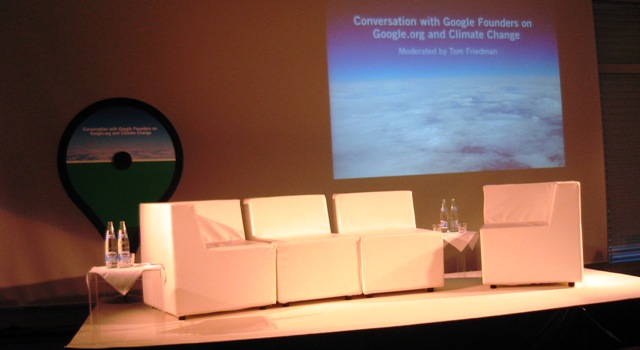
Waiting for Sergey Brin and Larry Page of Google, Larry Brilliant of Google.org and Tom Friedman
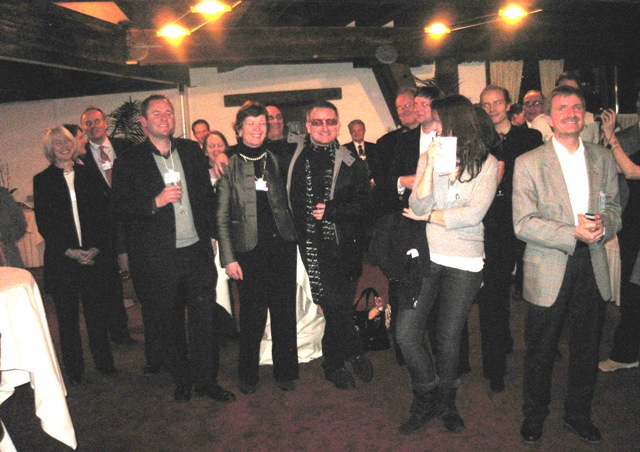
Bono and Mary Robinson embrace after Al Gore’s sermon on the market opportunities in global warming
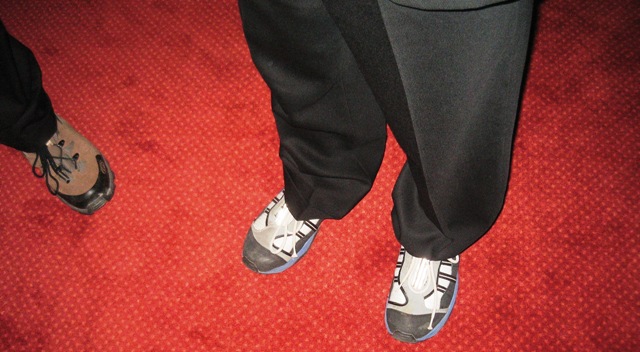
Bono commented on venture capitalist John Doerr’s shoes – so here they are
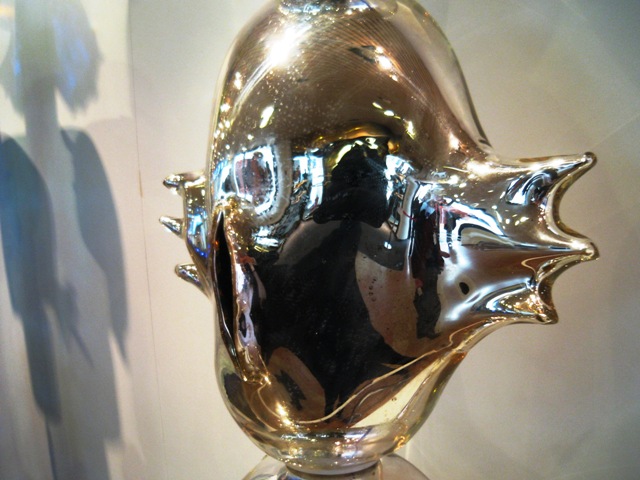
Part of a line of totem poles in the WEF annual meeting reception area
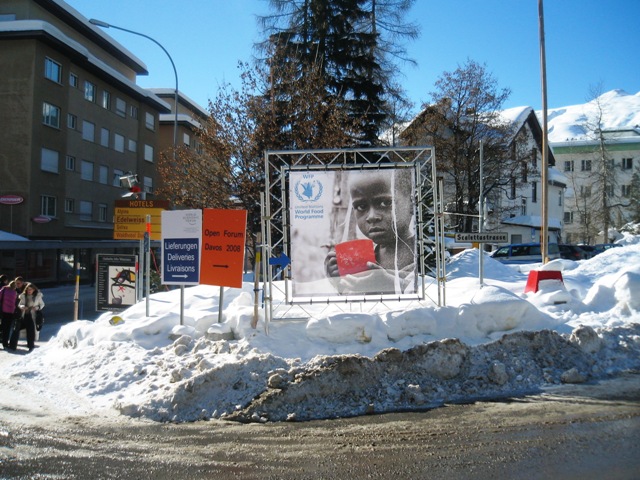
Ad for World Food Programme en route to a Nike lunch focusing on the plight of girls
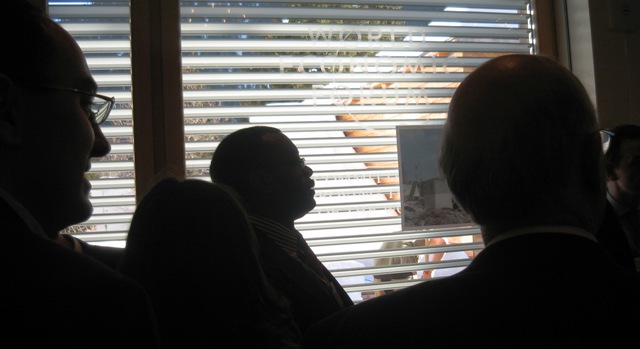
During the session I moderated in the WorkSpace for consumer sector CEOs
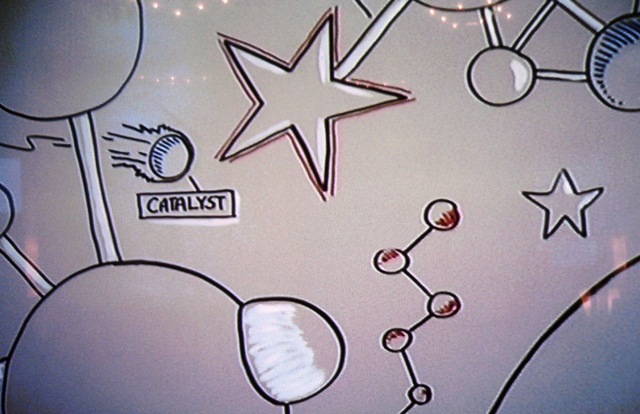
Detail of scribing during the session
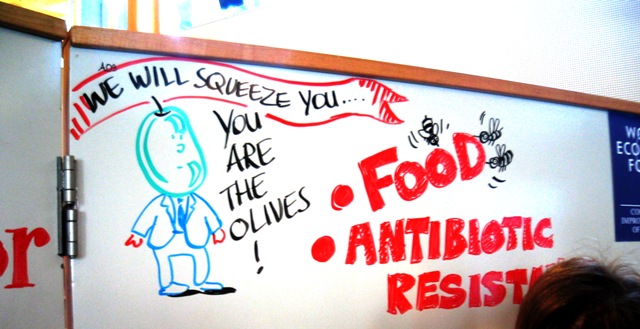
I told delegates that the WorkSpace was like an olive oil press – and they were the fruit
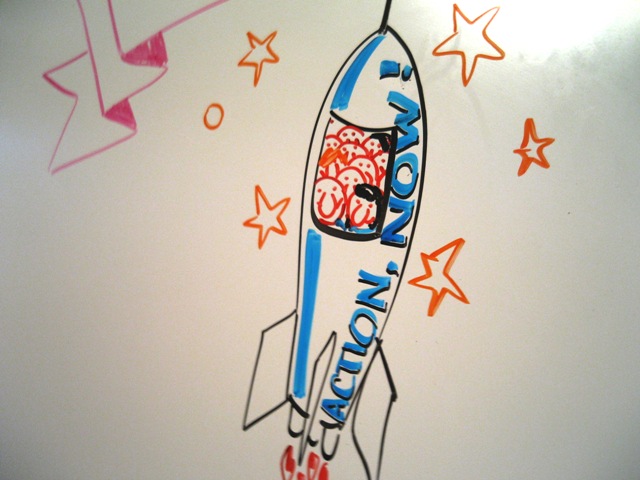
Action now!
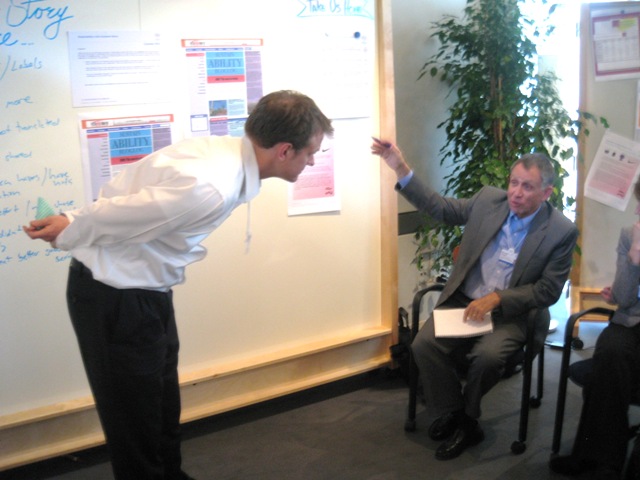
Reed Paget of Belu (UK Social Entrepreneur of the Year) stoops to confer
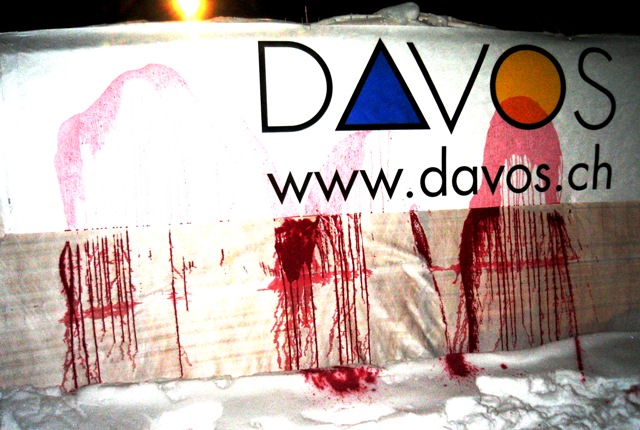
Aftermath of protests behind the Congress Centre
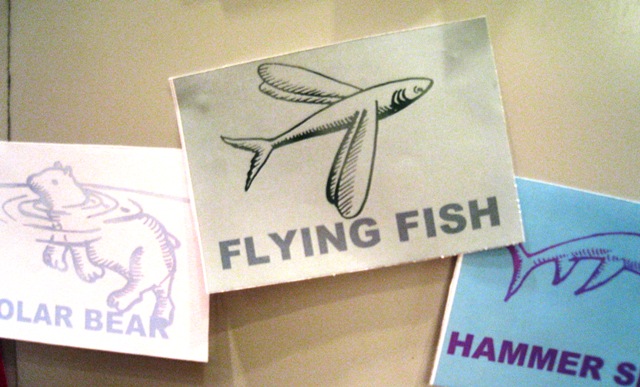
Spotted in the WorkSpace: the symbolism of Pisces volans will become clear later in the Spring
Tuesday, January 22, 2008
Co-authors
Here’s a picture that Doris Michaels, our literary agent based in New York (http://www.dsmagency.com), took of Pamela and I at the Schwab Summit earlier today.
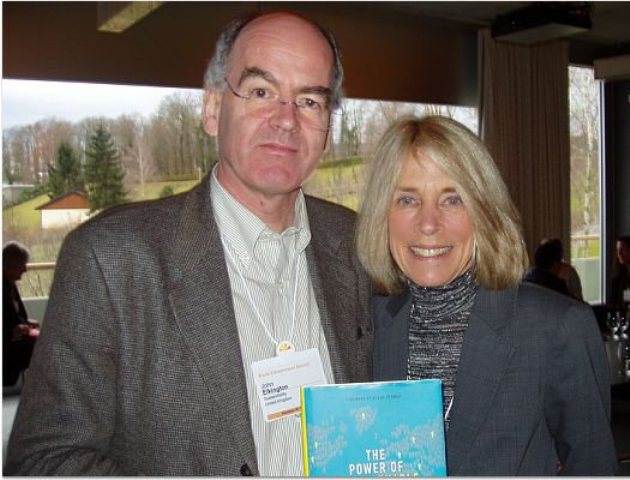
Two exhausted co-authors brought to book
Schwab Foundation summit
We arrived in Davos today, by train from Zurich – where we had been attending what may prove to be the last summit meeting of the Schwab Foundation for Social Entrepreneurship entrepreneurs. Held in the Swiss Re Ruschlikon complex outside Zurich, overlooking the lake, the event was organised very differently this year, with much more active engagement of the entrepreneurs and other participants. Wonderful gathering of the tribes. On the first evening Elaine, Sophia (Tickell) and I had dinner with Barbara Fiorito, who used to chair Oxfam in the US, and from that point on it was a veritable blizzard of conversations and connections. As the event wound down and it was announced that Pamela was standing down as Managing Director of the Foundation, she deservedly received a standing ovation – but, sadly, by that time we were already on the train to Davos.
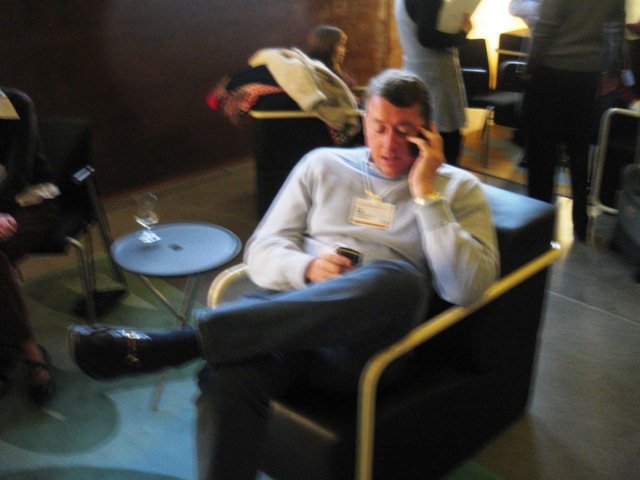
All a bit of a blur for Freeplay’s Rory Stear
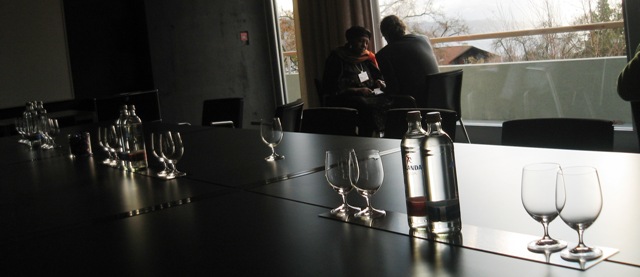
What’s the collective noun for glasses?
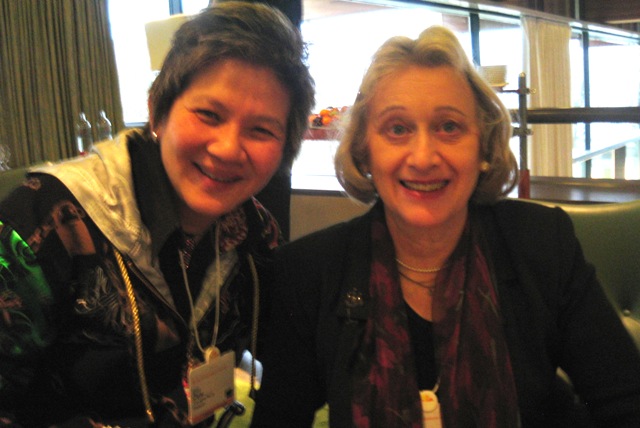
Elim Chew: Director, Social Innovation Park, Singapore) and Elaine
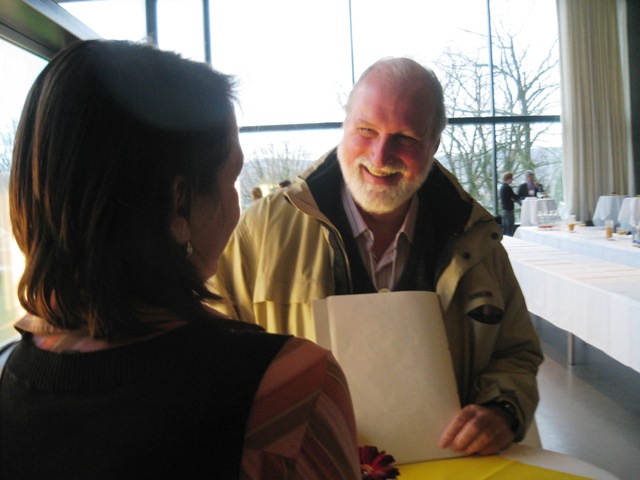
Ricardo (Young da Silva) of Instituto Ethos, Brazil
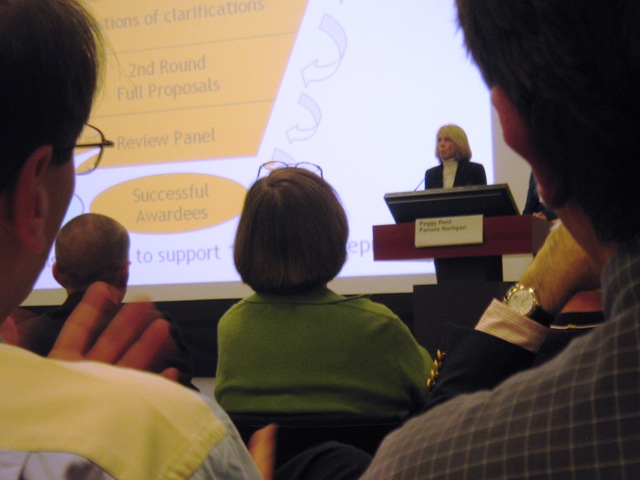
Pamela in full flow
Sunday, January 20, 2008
Expecting to Fly
Spent much of yesterday with Craig and Rachel Ray, working on the impending revamp of this website. Was busy well after midnight trying to find suitable photos for the section headings and so on. Just as well, because BA sent a text message to say that our flight to Zurich tomorrow (today) had been cancelled, so had to find an alternative in short order. Probably linked to the crash at Heathrow on the 17th, something none of us should have been surprised by. The recent safety record of the major airlines has been extraordinary, but the risks are always there.
As we prepare to fly, it’s an uneasy thought that statisticians note that rare events cluster. And with the flight lanes in to LHR passing directly over our home, I have often visualised what would happen if one of those things decided to pay a visit here. When we first moved here, it was more a question of kerosene being dumped in large quantities over the washing – and, closer in, where the wheels came down, frozen bodies falling out of wheel-wells. Heathrow has always been a difficult neighbour and its impending expansion, which I voted against in the recent public consultation, can only make things worse.
Friday, January 18, 2008
Visiting Professor
So, now I’m a Visiting Professor – at the Doughty Centre for Corporate Responsibility at Cranfield University’s School of Management (http://www.som.cranfield.ac.uk/som/research/centres/ccr/).
Thursday, January 17, 2008
Signing On
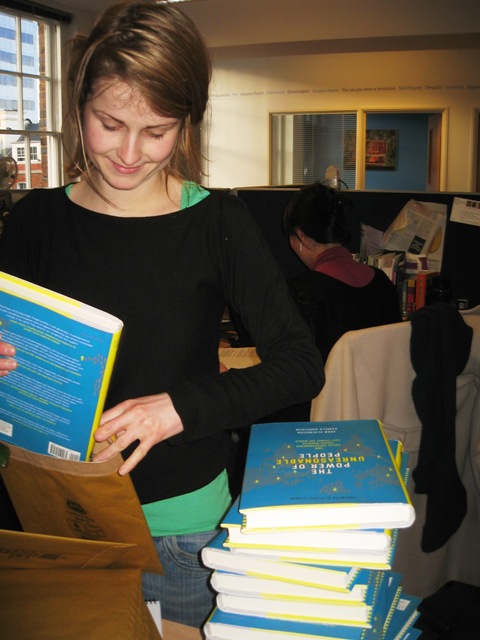
Ori
Now that copies of The Power of Unreasonable People have arrived in our London office, I have been doing a marathon signing session – and Ori (Chandler) and Sam (Lakha) have been sending the mailmen away laden to the gunnels (or gunwales). The pictures above and below were taken by Sam during the process, the last of which is an acknowledgement of where all this product comes from.
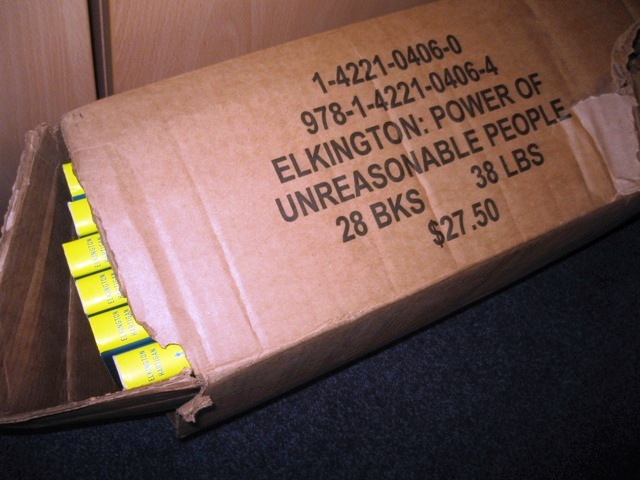
One of many packs
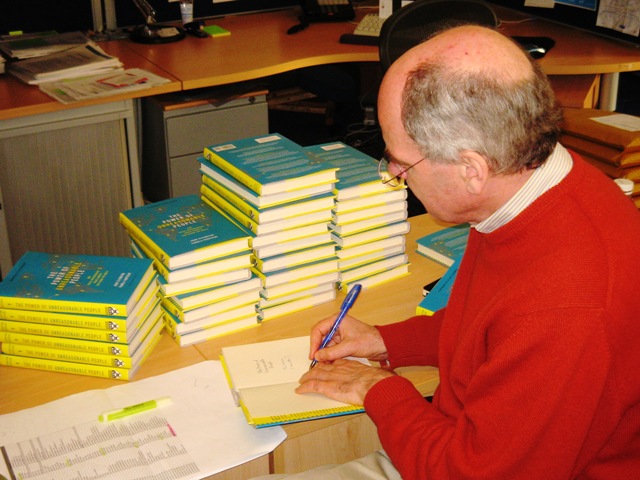
Can I plead RSI?
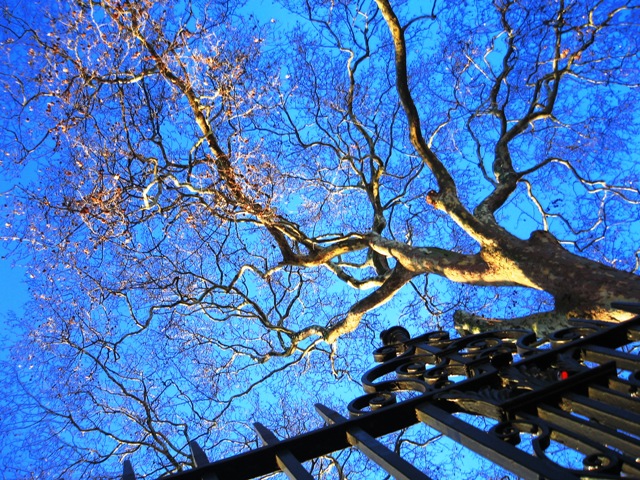
Arboreal neighbour
Sunday, January 13, 2008
Sir John Harvey-Jones
Returned from Washington to find the news that Sir John Harvey-Jones had died. It’s a long time since I last met him, having first interviewed him for ICI Magazine in the mid-1980s, when he was Chairman of ICI. He was certainly a breath of fresh air. But I also included some of the same interview in my book The Green Capitalists, published in 1987 – the year he retired from ICI. In retrospect, reading back through that section of the book, it’s interesting to see how even he was a captive at the time of pretty standard (and pretty defensive) industry views on issues like acid rain and ozone depletion.
The world was about to shift on its axis, however. With the Antarctic Survey discovering the Antarctic ‘Ozone Hole’ in 1985 and a UK Friends of the Earth campaign against CFCs having a major impact on public opinion in 1987, the ground was well prepared for our first green consumer campaign in 1988. It always struck me that ICI was full of great ideas for new, greener technologies, a number of which we spotlighted when I was a judge with initiatives like the Pollution Abatement Technology Awards (PATAS) and the Better Environment Awards for Industry (BEAFI), both hosted by the RSA. But precious few of those ideas ever made it through to the market.
Ironically, it was a chance comment from Mike Flux, ICI’s Group Environment Adviser at the time of the the ‘Green Designer’ exhibition at the Design Council in 1986, which I helped organise, that triggered the thinking behind The Green Consumer Guide. Mike noted that it was all very well for environmentalists like me to urge ICI to produce more environment-friendly technologies and products, but experience had shown that no-one wanted to buy them. OK, I thought, let’s mobilise the consumer, a phrase I coined for the Design Council exhibition, and off the green consumer rocket went.
Friday, January 11, 2008
World Entrepreneurship Summit 2008
Once I got back from Washington yesterday morning, I headed home to recover a bit from my aerial coughing, though that had been much less bad than it might have been becayuse I slept soundly. Then later in the day I headed in to the World Entrepreneurship Summit (http://www.wes08.net/) in the QEII conference centre, Westminster, to absorb some of the atmosphere and key issues ahead of my plenary presentation today.
When I took the stage, after the event got off to a late start, partly because of rain, I started with two rather startling images from the world of StarTrek, noting that making one’s away around the QEII centre in search of breakout sessions was a bit like trying to find one’s way around some abandoned space hulk, where you would look through internal portholes and see small groups of people earnestly debating (as perhaps they had already done for years, decades or even generations) questions around whether social enterprise is different from ordinary enterprise. Someone from the UN had told me yesterday that as far as he was concerned anything that was an enterprise and employed people was a social enterprise. So, I wondered aloud, did the Mafia fit the bill?
My second USS Enterprise picture is below – and I used it to look forward to the day when we could use something like Google Earth not just to spot concentrations of humanity or sources of greenhouse gas emissions, but to map the intensity of entrepreneurial effort on the great challenges of the new century.
I was then asked to join the following panel discussion, chaired by Vicky Pryce, Chief Economic Adviser at BERR and Joint Head of the UK Government Economic Services. The other panellists were George Polk (Founder, The Cloud and The Catalyst Project), Herta von Stiegel (Executive Chairman, StarGate Capital), Andrew Bainbridge (CEO, Bank Muscat International), George Dragnich (Director, Office of Economic & Development Affairs, US State Department) and Max Mickelsson from Microsoft. My mmemory is that the panel really caught fire and was a pleasure to be part of. Certainly as people wound out to coffee I overheard some very positive commentary.
Towards the end of the session, I took the opportunity to end a series of points by proposing a vote of thanks to Rebecca Harding, who has been the driving force behind WES – and there was a resounding outbreak of applause. She has been at least as ill as I, but soldiered on. True, much needs to be done to turn the summit into something really worthy of the name, but the vessel’s now well under way.

Brainstorm
Walking back around Barnes Pond on my way home from the World Entrepreneurship Summit, having extracted myself early because of my gathering flu symptoms, I found my brain playing havoc with various things it encountered – including the results of a recent storm. Odd how the mind begins to see the world in altered states. Everything starts to look slightly numinous – something Van Gogh caught with his study of a working man’s boots. Things begin to glow, as did this bench – though the light here was silvery, sold, wintry. The brancing patterns put me in mind of the blood supply to the brain.

Wednesday, January 09, 2008
Library of Congress
What a treat. Jonathan Halperin had fixed me up with a guided tour of the Library of Congress this morning. On arrival, I was taken under the comforting, highly informed wing of Madonna Robins and steered around this extraordinary institution. Fascinating wander around the ‘Exploring the Americas’ exhibition, with some amazing early maps of the Americas (http://www.loc.gov/exhibits/earlyamericas/).
Then I was handed over to Abby Yochelson for a tour of the Reading Room, plus – when I mentioned an interest – a visit behind-the-scenes to the old card index system, inevitably, thankfully, replaced by computers. She had a brief on my writing career to date, with 16 books included in their reference system and the latest, The Power of Unreasonable People, already on their radar screen. Still you would need a bevy of supercomputers to keep track of such outputs in the midst of the tsunami of new titles they receive each year.

Library of Congress 1: Knowledge lights the way
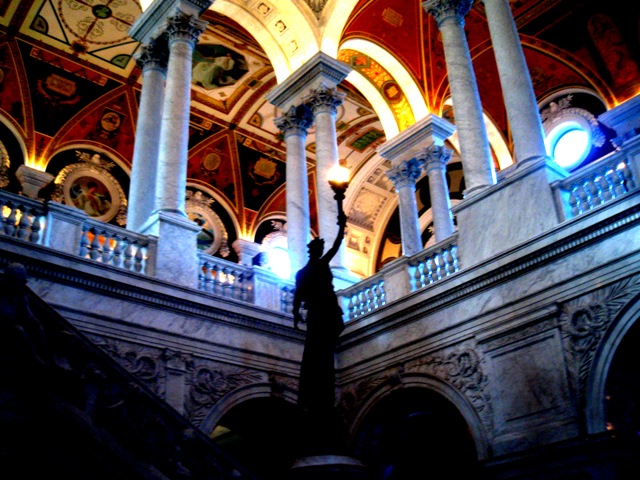
Library of Congress 2: Raising a torch
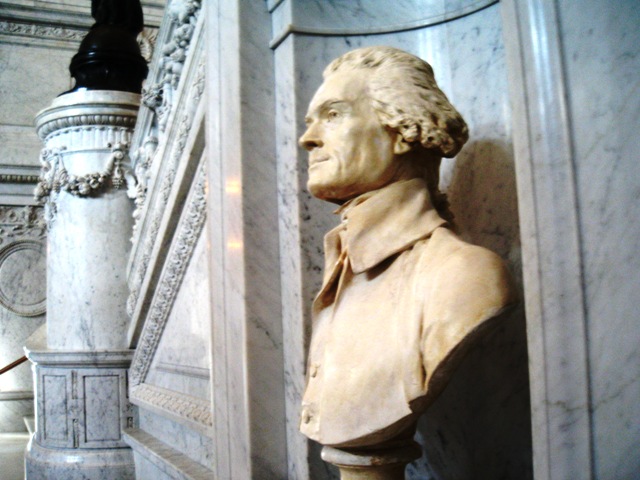
Library of Congress 3: Thomas Jefferson contemplates loss of much of his library, gifted to the Library, in a fire in 1851 (http://www.loc.gov/exhibits/jefferson/jefflib.html)
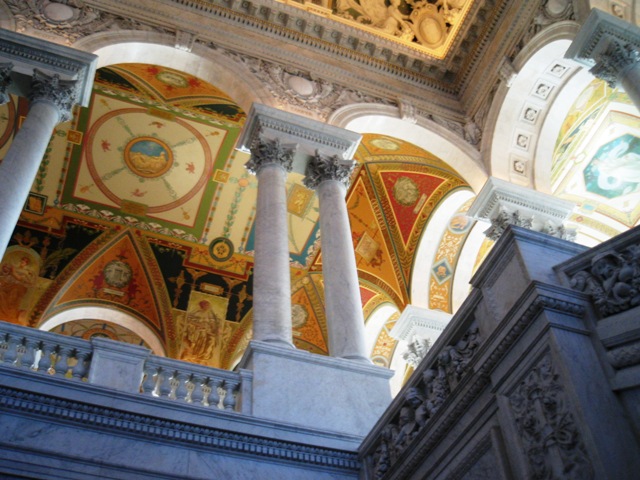
Library of Congress 4: Uplifting
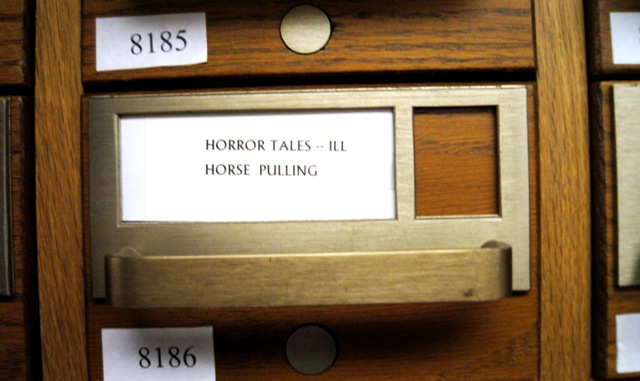
Lbrary of Congress 5: Card index – from Horror Tales to Horse Pulling

Library of Congress 6: Paws for thought in ‘Exploring the Americas’ exhibition
Tuesday, January 08, 2008
Fast Company Awards
Spent a glorious evening, albeit on cough sweets, at the Fast Company awards ceremony at the Westin Washington. SustainAbility won one of the 2008 Social Capitalist Awards (see http://www.fastcompany.com/social/ and, for my perspective on all of this, http://www.fastcompany.com/social/2008/articles/john-elkington.html).
Our table at the awards ceremony had been organised by Jonathan Halperin of our DC office – and I sat next to Herve Houdre, general manager of the famous Willard Hotel. He was the man who, after breakfast at The Willard, steered me across the road to a nearby Borders bookstore to ensure I tracked down a copy of an extraordinary biography of Benjamin Franklin, an early – and almost definitive – example of a social entrepreneur. The book: Benjamin Franklin: An American Life, by Walter Isaacson (Simon & Schuster, 2003). Made sure Herve got a signed advance copy of The Power of Unreasonable People this evening, in which he is credited in the Acknowledgements. Because Pamela was there, too, she signed also. (She and I had done a twin-header presentation of the book earlier in the day at the Fast Company conference that preceded the dinner.)
Some of the things Franklin did were not-for-profit, some for-profit. And it was significant that tonight’s awards went largely to not-for-profit social enterprises, but with – for the first time – a separate category of for-profit ‘social capitalists’. Alongside SustainAbility, and because of the tyranny of the alphabet I came last in a sequence of some 50 award recipients, were nine other for-profits: Better World Books, Developing World Markets, Domini Social Investments, Equal Exchange, Herman Miller, New Leaf Paper, Organic Family of Farms, Seventh Generation and ShoreBank. What truly glorious company to be in!
Of planes and adrenaline
Arrived at Terminal 4 shaken, stirred and almost beside myself on adrenaline breakdown compounds today after a breakneck trip around the M25 in a taxi, having been caught in a jam on an M4 exit road for 20-25 minutes. Got to the desk just in time to be told that if I had got there just 5 minutes earlier, my luggage would have got on board. Typically, as I headed home the road closure signs on the exit spur had been removed. Still, because I was meant to be flying business – thanks to a top-up with Air Miles – I can fly tomorrow at the same time.
The need to take account of unforeseen wrinkles is one I have to constantly re-learn. One of my worst flights was to Australia some years back, when I got on the wrong plane. Turned out I had tickets on two planes leaving at same time for Oz, one to Sydney and one to Melbourne. Meant to be on the latter, I found myself on the former – and airborne. The slight wrinkle here was that I was meant to be having an hour or two of rest in Melbourne ahead of a major speech, but had no idea how I was going to get from Sydney to Melbourne in time. In the event, I found a connection and got to the ventue just in time to take the stage. Am very much enjoying Craig Venter’s extraordinary book A Life Decoded at the moment, much of the early part of which is on his research on adrenaline receptors. My receptors must have been in overdrive that day.
Saturday, January 05, 2008
Reptile on BBC Today Program
Relatively early start, at least on a Saturday, when I’m likely to feel particularly reptilian in the morning. And ironically, given the subject I was to talk about, I was picked up by an ultra-smart BMW early this morning to be whisked across to BBC for an interview on rising oil prices – alongside Tony Juniper of Friends of the Earth. Unfortunately, the interview didn’t really engage some of the issues I had discussed the previous day with the researcher, but my sense is that rising energy prices are a necessary condition (and a catalyst) for a profound restructuring of the global economy – as argued in my 2001 book, The Chrysalis Economy. My problem is that I try to answer the questions asked, rather than driving my own agenda from the outset.
A central idea in that book was that the first 30 years of the new century would see the same sort of processes in the economy as you see in a chrysalis, where a resource-intensive, environmentally damaging organism (the caterpillar) goes in and – after a period of total meltdown, where the old organs are pretty much liquidised to provide the nutrients needed to build the new – a much more sustainable organism (the butterfly) emerges. As we enter recession, I see this as the threshold of a fundamental reworking of the economic order. Perhaps not surprisingly, when I attempted an economics degree in the late 1960s, the two economic thinkers I found most interesting were Nikolai Konradtiev and Joseph Schumpeter …
Nor will all of this be uniformly good news in terms of sustainable development. Instead, we will see some extremely worring trends in terms of political economy. The news yesterday that Gazprom is trying to gain access to Nigerian oil and gas reserves has to be seen as bad news by western companies that have argued they can’t stop flaring in short order, since that is part of what Gazprom now seems to be offering.
Whatever the facts of the matter, no-one who has seen BRIC energy companies at close quarters can be under any illusion that they will get anywhere near competing with western companies on humans rights and environmental priorities. For that to happen, we need a sustained 15-20 year campaign focusing on them – and keeping them under the same sort of concerted pressure that has persuaded their western counterparts to at least begin the processes of change. The work of the Business & Human Rights Resource Centre is one part of that, but we need to massively scale up our efforts in this area.
Backing Obama
Don’t quite know what to make of his chances of bringing real change if he finally made it to the White House, but the news today of Barack Obama’s win in Iowa feels like a huge shot in the arm. Have long felt that a Bush-Clinton-Bush-Clinton outcome would not only take us back to the Roman Empire but also sound the death knell for something quintessential in American politics. Suddenly, there’s a sense of new shoots, new potential, new hope – all the more important given what has been happening in places like Pakistan and Kenya.
Having spent part of today in the East End of London, I’m even more persuaded of the need for the broad mass of people to believe in a better future – and for political leaders to make it possible for ordinary people to believe that they can make real changes for the better in their own lives and conditions. But, even more importantly, there is a need – something Obama has publicly acknowledged – to “renew America’s moral position in the world.” In that respect, I find it simply astounding how far that great country has fallen in recent years.
Friday, January 04, 2008
Les Echos

Delighted that we got an article into the French financial daily Les Echos today, on the subject of responsible supply chain management. I wrote it with my SustainAbility colleague Jean-Philippe Renaut and spotlighted the work of EcoVadis (http://www.ecovadis.com/).
Wednesday, January 02, 2008
Year of the Frog

Having been switched on to wildlife and environmentalism in large part by amphibians in Northern Ireland – and having spent recent years in a growing state of anxiety about the impact of the chytrid fungus on amphibians – see 4 February 2006 entry (http://johnelkington.com/weblog/http://johnelkington.com/january-2008/) in this Journal – I was pleased to see in today’s Times (http://www.timesonline.co.uk/tol/news/environment/article3118736.ece) that 2008 has been declared the International Year of the Frog.
Weirdly, when asked for a US survey of environmentalists for my favourite animals only yesterday, this was what I (very selectively) fired back:
Q3: Favourite animal?
“Can’t do just one …
– Mammals: hares, meerkats, lemurs, dolphins, humpback whales – indeed more or less any whales
– Birds: The red kites that have been reintroduced in the west of England
– Amphibians: frogs, toads, salamanders
– Reptiles: chameleons
– Fish: The flying fish
– Insects: the honeybee and the dragonfly …”
In any event I, for one, will be supporting the Amphibian Ark campaign (http://www.amphibianark.org/yearofthefrog.htm) to save frogs, toads, salamanders and the like.

Leave a Reply